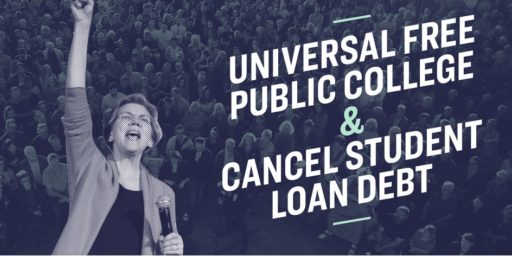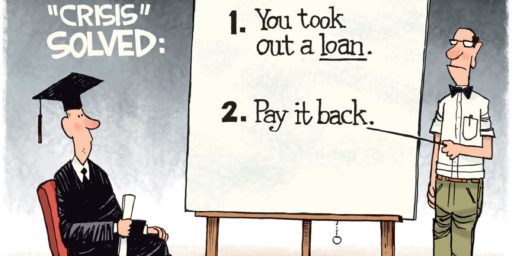Would Immigration Solve Housing Crisis?
A few weeks back, Thomas Friedman ran this tongue-in-cheek proposal for getting us out of the financial mess, particularly in the housing market.
“All you need to do is grant visas to two million Indians, Chinese and Koreans,” said Shekhar Gupta, editor of The Indian Express newspaper. “We will buy up all the subprime homes. We will work 18 hours a day to pay for them. We will immediately improve your savings rate — no Indian bank today has more than 2 percent nonperforming loans because not paying your mortgage is considered shameful here. And we will start new companies to create our own jobs and jobs for more Americans.”
Tyler Cowen and Alex Tabarrok have been pushing a variant of this idea — Buy a House, Get a Visa — for months. It’s starting to take off. Richard Lefrak and Gary Shilling argued in WSJ earlier this week that, “The Obama administration should seriously consider granting resident status to foreigners who buy surplus houses in this country.”
The blueprint for a program to sell surplus housing to immigrants is already in place with the EB-5 visa program. Each year, 10,000 EB-5 visas for this country are available for foreigners who each invest $1 million in a new enterprise ($500,000 in economically depressed areas) that creates at least 10 full-time jobs. After two years, the entrepreneur and his family can become permanent residents.
Cowen likes the idea and suggests lowering the threshold to $100,000 (which strikes me as low, although it would buy a modest sized house in much of the country). He links to John Mauldin who has a very detailed look at the policy, based on papers Shilling sent him. He observes that, “the US is already allowing roughly 1 million immigrants a year into the country” and that this would “simply change the nature of what constitutes the conditions for acceptance, so as to jump start the housing industry and the economy.”
The massive losses because of bad loans that are being subsidized by US taxpayers would be stemmed, saving many hundreds of billions, if not a trillion or more dollars. The excess inventory of homes would quickly disappear and the millions of jobs that were lost as home construction fell into a deep depression would come back. If housing values rise, many families would be able to refinance their homes at lower rates and have more income left over after paying their mortgages. $12 billion in commissions would end up in real estate agents’ pockets, helping a very battered and bruised group. Hundreds of billions will flow into local businesses, as these new immigrants will need to furnish their homes. This could mean as much as a half trillion dollars in sorely needed stimulus in the next few years, without one penny of taxpayer money and actually adding taxes back to governments from local to national. And we are not bringing in 1 million foreigners, we are attracting 1 million mostly middle-class new Americans, which, if we are smart in how we do this, will result in more jobs for all Americans.
There’s a ton more at the link, with charts and everything. They emphasize, too, that background checks and whatnot would still be conducted.
The commenters provide interesting rebuttals including moral ones (“reverse colonialism”) and practical ones (“Why any foreigner like myself who has the skills and financial ability to start such a business would choose instead to purchase an overpriced home is beyond me” and that this is “biased towards older generations, and [is] not fair to younger Americans who want to buy their own home”). The former doesn’t much bother me — nobody would be forced to come — and the latter strike me as largely self correcting.






James, without mentioning it by name, why don’t you consider how my “pet agenda” would stimulate the housing crisis and overall economy? It also would provide some solutions to the illegal immigration problem. It provides many solutions to problems we face today.
Hopefully Steve Verdon will be curious enough to study it and open a debate.
Confusing causes with effects. I have a question: how would the Indians, Chinese, and Koreans finance their purchase? The average house in Los Angeles County costs about $300,000. If they’re contemplating these Indians, Chinese, and Koreans paying cash that would come to roughly $600 billion. I doubt there’s that much liquidity in the three countries put together.
BTW “surplus houses” aren’t in “much of the country”. Surplus houses are in the most expensive counties.
Dave – from a completely anecdotal perspective based on years of observation of Chinese (from Mainland, Hong Kong, and Taiwan)and Korean immigrants buying real estate in Los Angeles and Washington DC, paying $300k in cash is not a problem for many of them. While I’m not talking about millions of them, there are still enough of them that they can make a dent in some of the most depressed markets like LA and Las Vegas. Asians have a very high savings rate and many business people in those countries have socked away a lot of money over the years. I have a middle class relative in Hong Kong that recently sold a flat in London and are waiting for an opportunity to buy once the market settles. She is not that much different from many there that have second homes in foreign countries. In the 80s and 90s, many people from HK received Canadian residency based on their ability to buy real estate and start businesses in Canada. Give them this opportunity here and they’ll pounce.
That’s the point. For a couple of thousand, sure. But not millions. It’s not a scalable solution.
And the new immigrants wouldn’t be distributed evenly throughout the country, they’d be concentrated in a handful of areas where they would present unmanageable demands on local services. The idea deserves to be treated with scorn rather than admiration.
It may be the worst in the most expensive counties, but it is not exclusive to them.
At a time when the unemployment rate in Nevada and California is double digits, does it really make sense more adults who will compete for jobs. Does anyone really believe that another Korean dry cleaners, Vietnamese nails salon, or Chinese restaurant will actually produce jobs for people outside of those ethnic groups.
Depending upon clannish groups from closed society to help U.S. citizens is incredibly naive and foolish.
Yeah, all those Asians and other immigrants (Jerry Yang, Sergey Brin) who started up the companies like Yahoo and Google in Silicon Valley were stealing jobs from honest Americans. It’s not a zero sum game.
DC Loser,
If you are not Korean and try to open a cleaners in DC, the Korean Cleaners associations will make your life hard. They will file complaints, sue you, and to everything they can to use their monopoly power to put you out of business.
When you realize that cheating on their taxes is part of the business plan for most small Asian owned businesses, you would realize what a stupid idea this is. When was the last time you saw a white person working at the Eden Center?
superdestroyer – Apparently you have a personal problem with Asian Americans. I wouldn’t dignify a response to that since what’s that have to do with the issue James raised. And I wouldn’t know the answer to your question since I haven’t set foot inside the Eden Center in over a dozen years.